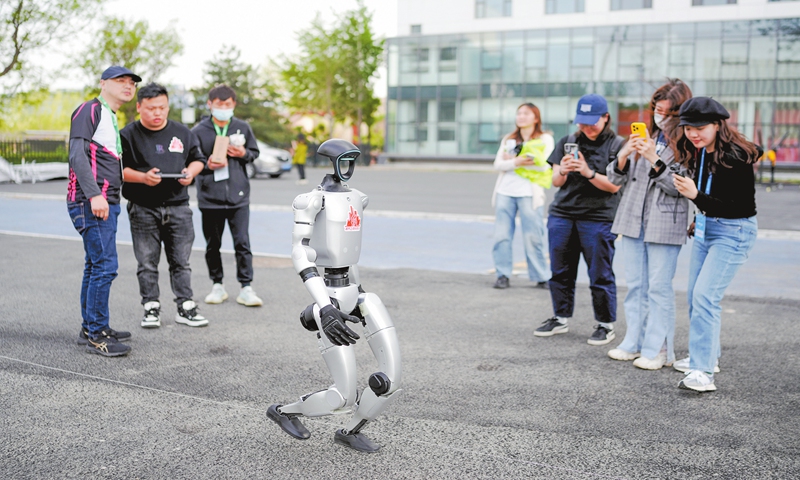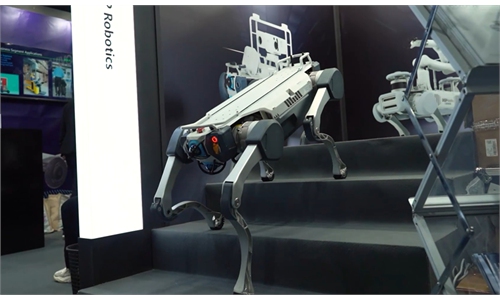
Visitors take photos of a humanoid robot preparing for a half-marathon on April 17, 2025. The half-marathon is expected to be held in Beijing this weekend. Photo: VCG
China's first Embodied Artificial Intelligence Robot Games will be held from April 24 to 26 in Wuxi, East China's Jiangsu Province. The inaugural event is expected to be a grand showcase of the latest advancements in embodied intelligence technology, according to the Chinese Institute of Electronics (CIE), the event's organizer, on Tuesday.
The event will feature a multifaceted event, including competitions, exhibitions, carnivals and thematic conferences, the CIE told the Global Times. The competitive segment will encompass athletic events such as sprinting, cross-country running, football, basketball and dancing, as well as application-oriented contests such as material handling, intelligent grasping and indoor rescue scenarios.
Representatives from leading Chinese robotic companies such as Unitree, Leju, Xiaomi Robotics, UBTECH, AgiBot and the Shanghai-based National and Local Co-Built Humanoid Robotics Innovation Center, Humanoid Robot (Shanghai) Co will attend the contest sessions.
"This is the first comprehensive sports event for embodied intelligence and humanoid robots in China," said Li Yang, secretary-general of the World Robot Contest Organizing Committee. Compared with the just-concluded world's first half-marathon featuring both robotic and human participants held in Beijing, the Wuxi Games are expected to be on a much larger scale, showcasing a wide range of advancements in robot technology, Li said.
"The competitions will test not only the robots' perception, environmental adaptability and movement control but also their decision-making and planning capabilities, which are akin to the robots' 'brains'," Jiang Lei, chief scientist of Shanghai-based National and Local Co-Built Humanoid Robotics Innovation Center, told the Global Times on Tuesday.
For example, in dynamic decision-making scenarios, such as football and basketball, robots must rapidly analyze the game situation and make split-second choices, such as whether to pass, shoot or defend, said Jiang.
Companies participating in the games will showcase their latest humanoid robot models with remarkable flexibility in their joints and precision in their movements. Shanghai-based AgiBot will showcase the 1.3-meter tall and 33.8-kilogram Lingxi X2 humanoid robot, featuring excellent sports, interaction and operation competence, the company said. Also, robots developed by Hangzhou-based Unitree will participate in the sprinting and dancing contests.
The competitions reflect the rising popularity and rapid innovation of China's robotics industry, which is fueled by an artificial intelligence boom and the country's drive for technology self-sufficiency amid intensifying global competition, Jiang said, adding that it will also showcase China's robotics technology development, reveal the innovative vitality of young tech companies and attract the interest of other firms looking to engage in collaboration.
According to a report released by research firm TrendForce on Monday, China's humanoid robot manufacturers are set to significantly increase production in 2025. The total value of humanoid robots produced in China is expected to reach about 4.5 billion yuan ($616 million). Six out of the 11 domestic humanoid robot makers - Unitree, UBTECH, AgiBot, Galbot, Engine AI and Leju - plan to manufacture more than 1,000 units each in 2025, said the report.
A recent Morgan Stanley report revealed that among the worldwide listed companies confirmed to be involved in humanoid robots, 73 percent are based in Asia, with Chinese companies accounting for 56 percent of this group. The research also found that China showed the "most impressive progress in humanoid robotics," as start-ups benefit from "established supply chains, local adoption opportunities, and strong degrees of national government support."



